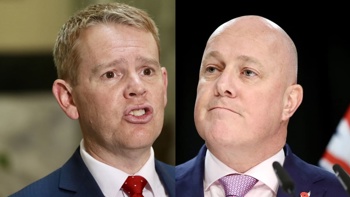Schools - including Christian institutions - are strongly encouraged to use transgender students’ preferred names and pronouns, guidelines show.
In a ruling released this week, a high school teacher was deregistered by the Teaching Council for refusing to use a transgender student’s chosen name and pronouns.
The maths teacher, whose name was withheld in a Disciplinary Tribunal decision, told the 14-year-old student that gender transition went against his Christian beliefs.
Ministry of Education general manager Sela Finau said today that boards of all schools were required by law to cater to students with different needs and make sure that school was a physically and emotionally safe environment.
The legislation does not address specific issues such as names and pronouns, but the ministry commissioned guidelines last year which aimed to give schools and teachers some direction on this issue.
The guidelines by charity InsideOut said that using a person’s chosen name and pronouns was about respecting their right to self-determination.
“Self-determination is especially important in this context, given that trans and gender diverse people often feel that the binary gender boxes they have been placed in are constricting, false, or simply uncomfortable.”
Using the correct titles could have positive impacts on a student’s mental health, the document said, with one study finding that it could significantly reduce depressive symptoms and suicidal behaviour.
InsideOut recommended that schools streamline their enrolment and information systems to reduce the chances of a student being misgendered. It also noted that some students may want to use one name at school and another at home if their parents were not supportive of their transition.
Auckland Secondary Schools’ Principals Association president Greg Pierce said schools were required to use students’ legal names for formal reporting purposes. But for daily, practical use, most schools preferred to use students’ chosen names and pronouns, he said.
Christian schools are not exempt from requirements to protect and support trans students.
Integrated schools, most of which are Catholic, are entitled to have a special character, but were still bound by human rights legislation, Finau said. That included the right to freedom from discrimination on the basis of sex, which has been interpreted to include gender identity.
Dr Kevin Shore, who leads the Association of Proprietors of Integrated Schools, said Catholic bishops had provided clear directions and guidelines in support of trans students to ensure they are safe and supported.
A briefing document by the ministry in 2021 showed that schools were often unsure about how to support transgender students or the best way to handle issues around gender identity.
Ministry officials said at the time they were receiving a range of requests from schools, students and boards about how to best care for LGBTQIA+ students. The most common requests were for advice about toilets, school sports and changing students’ names or gender in school records.
“For example, we have been asked by schools to confirm whether schools should use a student’s preferred name and gender if this differs from the details in their student records.
“Our legislation does not specifically include this level of detail and schools are unsure if they are allowed or required to.”
The InsideOut guidelines were designed to provide clarity where the law did not.
However, the ministry noted that its guidelines for schools were not mandatory, and this “leaves confusion for schools on what the Ministry of Education expects schools should do in day-to-day practice, particularly regarding support for transgender and non-binary students”.
Officials added: “In our direct advice, we include an expectation that schools will discuss these kinds of matters with students and whānau and act accordingly (for example, by using a student’s requested name and gender)”.
The Growing Up in NZ longitudinal survey of 4500 young people found around 4 per cent of young New Zealanders said they identified “somewhere in the middle” of male and female, and another 1 per cent said they “didn’t know” what gender they were.
The ministry cited a Youth survey from 2012 which said around 4 per cent of students identified as non-binary or transgender.
Isaac Davison is an Auckland-based reporter who covers health issues. He joined the Herald in 2008 and has previously covered the environment, politics, and social issues.
Take your Radio, Podcasts and Music with you









